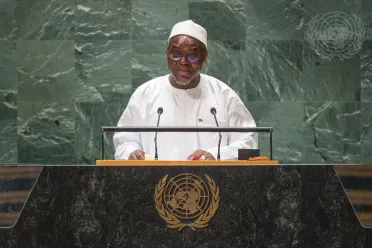Statement
Statement summary
MOHAMMED JALLOW, Vice-President of Gambia, said the current problems the world faces call into question the readiness and suitability of multilateral organizations in addressing them, stating that the “priorities of our times urgently warrant our collective attention and action.” He therefore called for reform of the multilateral system, adding that a renewed faith in both the United Nations Charter and inclusive multilateralism is the pathway towards attaining this. Aligning with the session’s theme on rebuilding trust and reigniting solidarity, he also called for better cooperation and greater partnerships to provide solutions to global problems. He pointed out that with seven years remaining to the end of the Decade for Action, “global attainment of the SDGs is not very positive. It is a story of unfulfilled commitments, weak international cooperation, and lack of genuine global solidarity.” He therefore called on the international community to redouble efforts towards attainment of the Goals.
Spotlighting the issue of debt relief for least developing countries, he called for a reform of the international financial institutions, particularly in areas of development finance and debt, to enable them to have “greater participation and a stronger voice in decision-making.” Against this backdrop, he welcomed the recent accession, on a permanent basis, of the African Union to the Group of 20 (G20), a development, which “will immensely amplify Africa’s voice and participation in global geopolitical and development issues that concern the wellbeing of its people.” He further noted the negative implications of climate change on Africa, stating that the continent is paying a very heavy price for global warming while being the least contributor to climate change. He therefore called for an urgent action in rebuilding trust and collective response to the climate crises.
On global peace and security, he highlighted Africa’s challenges with terrorism, armed conflicts and the illegitimate overthrow of Governments as well as the Russian Federation’s invasion of Ukraine, a situation which “should serve as a wake-up call for all Member States.” It also reveals the inadequacy of the institutions, mechanisms and processes of conflict resolution and management, necessitating improvements in same. He highlighted his country’s commitment to human rights, rule of law, democratic governance, peace and security.
Expressing his nation’s disapproval of the “cruel and degrading treatment meted out to migrants at certain borders in Africa and beyond,” he called on the United Nations to investigate crimes committed against migrants with the objective of protecting them and their families. He also called for a resolution of the Israeli-Palestinian conflict, with a two-State solution along the 1967 borders with two contiguous States living side by side in peace and harmony, with east Jerusalem as the capital of Palestine. For Cuba, he called on the United States to lift the embargo that has endured for too long. The Gambia also strongly endorses the One-China Policy, while aligning with Africa’s position on reform of the Security Council to regain the world’s trust, he said.
Full statement
Read the full statement, in PDF format.
Photo

Previous sessions
Access the statements from previous sessions.
